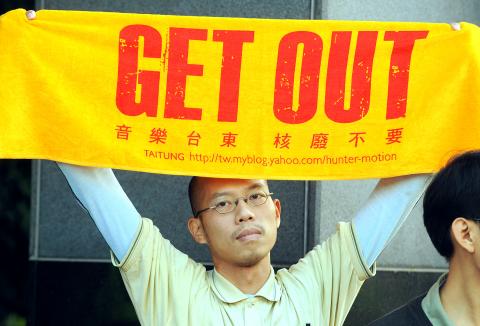A dozen anti-nuclear activists protested in front of the Environmental Protection Administration (EPA) building in Taipei yesterday, accusing the government of having no solution for dealing with nuclear waste.
The protest occurred as an environmental impact assessment meeting was beginning at the EPA.
Thousands of anti-nuclear protesters clashed with police over nuclear waste issues in Germany on Friday.

Photo: CNA
Earlier this month, the Ministry of Economic Affairs said that high-level radioactive waste could be disposed of outside of the country and that low-level radioactive waste could be disposed of in Taiwan, some within the plants and some in repositories, during a press conference on energy policy at the Presidential Office.
At yesterday’s second environmental impact assessment meeting on radioactive waste disposal policies, the Atomic Energy Council reported its strategies on nuclear waste storage, including putting the spent fuel rods in storage pools, land-based dry repositories and a final disposal site, while interim storage of spent fuel may include reprocessing abroad.
The protesters said the government was hiding the truth about the danger of both wet and dry storage of spent nuclear fuel by saying that the waste could be dealt with abroad, when actually the final disposal site might be in Taiwan.
They urged the government to halt operations at nuclear power plants to prevent the threat posed by an increasing number of nuclear fuel rods while no safe disposal site exists.
“There are two methods of disposal beyond our national borders. One is to dispose of the spent fuel at a final disposal site abroad, for which there is no precedent internationally,” Green Citizens’ Action Alliance secretary-general Hung Shen-han (洪申翰) said.
“The second is to ship the spent fuel abroad for reprocessing, meaning the uranium would be refined and recycled, but will still be shipped back to Taiwan,” Huang said. “It is irresponsible to say that we can dispose of the spent fuel beyond our national borders.”
The alliance said a feasibility study on the final disposal site would not be finished until 2037, but with the unstable geological conditions in Taiwan and possibly no safe disposal site abroad, it said it wondered where the large number of spent fuel rods would be stored.
“We suggest the government store spent fuel in the basement of the Presidential Office, to let -everyone know that it isn’t dangerous,” Gongliao Anti-nuclear Self-Help Association chairman Wu Wen-chang (吳文樟) said.
The protesting groups included the Green Party Taiwan, Wild at Heart Legal Defense Association, the Homemakers’ Union and Foundation, Taitung Anti-Nuclear, the Anti-Spent Fuel Association and several others.

CAUTION: Based on intelligence from the nation’s security agencies, MOFA has cautioned Taiwanese travelers about heightened safety risks in China-friendly countries The Ministry of Foreign Affairs (MOFA) yesterday urged Taiwanese to be aware of their safety when traveling abroad, especially in countries that are friendly to China. China in June last year issued 22 guidelines that allow its courts to try in absentia and sentence to death so-called “diehard” Taiwanese independence activists, even though Chinese courts have no jurisdiction in Taiwan. Late last month, a senior Chinese official gave closed-door instructions to state security units to implement the guidelines in countries friendly to China, a government memo and a senior Taiwan security official said, based on information gathered by Taiwan’s intelligence agency. The

The National Immigration Agency (NIA) said yesterday that it will revoke the dependent-based residence permit of a Chinese social media influencer who reportedly “openly advocated for [China’s] unification through military force” with Taiwan. The Chinese national, identified by her surname Liu (劉), will have her residence permit revoked in accordance with Article 14 of the “Measures for the permission of family- based residence, long-term residence and settlement of people from the Mainland Area in the Taiwan Area,” the NIA said in a news release. The agency explained it received reports that Liu made “unifying Taiwan through military force” statements on her online

Taiwan Semiconductor Manufacturing Co (TSMC), the world’s largest contract chipmaker, said yesterday that it is looking to hire 8,000 people this year, at a time when the tech giant is expanding production capacity to maintain its lead over competitors. To attract talent, TSMC would launch a large-scale recruitment campaign on campuses across Taiwan, where a newly recruited engineer with a master’s degree could expect to receive an average salary of NT$2.2 million (US$60,912), which is much higher than the 2023 national average of NT$709,000 for those in the same category, according to government statistics. TSMC, which accounted for more than 60 percent

Tung Tzu-hsien (童子賢), a Taiwanese businessman and deputy convener of the nation’s National Climate Change Committee, said yesterday that “electrical power is national power” and nuclear energy is “very important to Taiwan.” Tung made the remarks, suggesting that his views do not align with the country’s current official policy of phasing out nuclear energy, at a forum organized by the Taiwan People’s Party titled “Challenges and Prospects of Taiwan’s AI Industry and Energy Policy.” “Taiwan is currently pursuing industries with high added- value and is developing vigorously, and this all requires electricity,” said the chairman